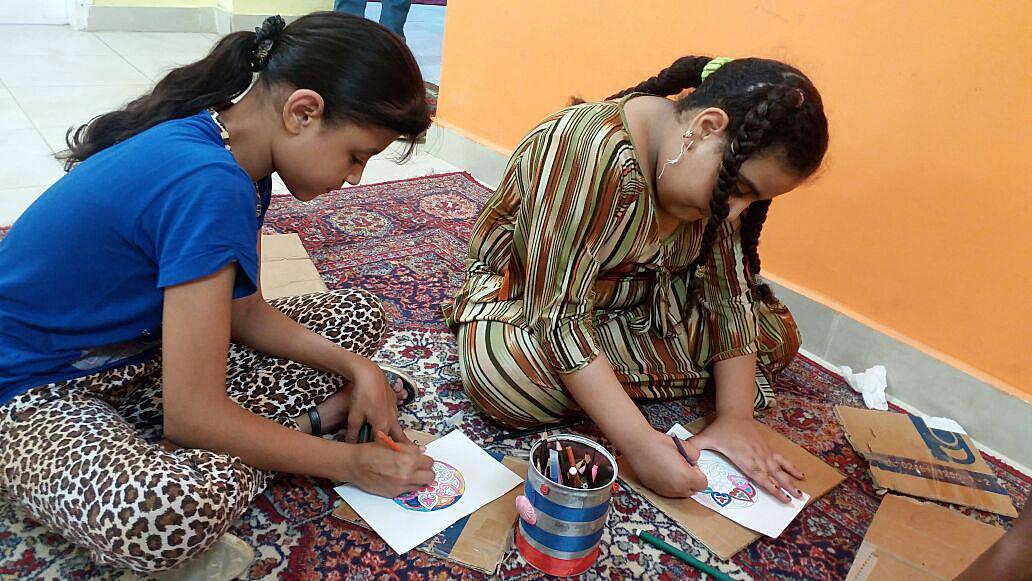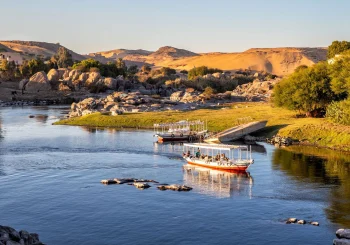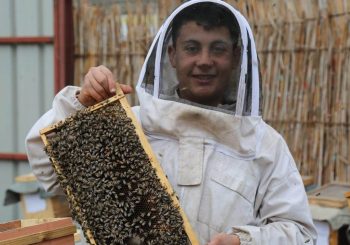Education is one of the primary drivers behind national development, while also being a key factor in economic growth and prosperity. For Egypt, the educational system is often overburdened and underfunded, leaving many of its most vulnerable citizens without access to adequate schooling and training.
Founded 10 years ago, the organisation aims to supplement education on a community level, based on assessments of the community’s needs for art and after school activities.
In its earliest incarnation, Alwan & Awtar functioned as a center for visual and performing arts, which incorporated life skills into their program. The organization has since expanded to include three core programs: the Visual and Performing Arts program, the Library program and the Live and Learn program.
Sarah Samaha, the curriculum design coordinator for Alwan & Awtar, explained that the Visual and Performing Arts program focuses on providing beneficiaries with the opportunity to engage in various forms of artistic activities, such as handicrafts, music and performing, and helps children express themselves through these art forms. Their Library program is aimed at inspiring children to read more, and in some cases be taught how to read. The Live and Learn program provides children with activities that focus on developing skills by exposing them to mathematics, science, literacy and life concepts through engaging and interactive activities.
“One of the long-term activities that the program offers spans six months and takes a multidisciplinary approach, incorporating project-based and inquiry-based learning, posing questions such as ‘who am I and who are we?’, ‘How do we communicate?’ as entry ways to the content the children will be introduced to,” Samaha explained. “The intention is for children and youth to embark upon a learning journey that both inspires and informs them, providing them with new tools that enable them to later improve their living conditions, both socially and economically.”
Samaha said these programs help develop a variety of cross-cutting skills aimed at helping the children grow as individuals. Children are taught how to identify and develop personal values through self-awareness and self-discovery. They are also encouraged to exercise critical thinking, problem solving and creative thinking. The children also learn how to deal with diversity, by honing in their communication skills and through collaboration. The programs also help children develop their learning and knowledge-building skills.
The first center was opened in Moqattam in 2006. According to Heba Ghannam, the partnerships and communication officer for Alwan & Awtar, the program was met with very positive responses from the community. A second center was later established in Ezbet el-Nasr. Over the past ten years, Alwan & Awtar has given roughly 5,000 children the chance to develop crucial life skills and expand their artistic and educational capabilities.
As time passed, the children the center had initially stepped in to help grew older and their needs evolved. In response, Alwan & Awtar expanded their scope to include programs for adolescents. “The first wave of children we helped have grown up and have different needs,” Ghannam explained. “They need skills and internships, and so we want to launch adolescent-oriented programs.”
Not only has the response from the community been positive, many of those who have benefitted from Alwan & Awtar’s programs have gone on to work for the organization itself and other developmental agencies, thus giving back to their own communities.
Alwan & Awtar’s journey has not always run smoothly. In 2014, the organization was forced to temporarily close its doors by the state due to administrative issues. Their closure was met with disapproval by the communities they served, with many protesting the government’s decision and calling for their reinstatement. Thankfully, Alwan & Awtar managed to reopen their doors in 2015 and have continued to serve their communities since.
Alwan & Awtar’s latest project is a third location, situated in Kafr Hamza in Qalliubia. This project will serve as an eco-lodge and community center, which targets supplementing the organization’s income in order to fund new projects. “A very generous friend of Alwan has offered to allow us to use her villa,” Ghannam said. “Part of this villa will operate as an art center for the children of the village, and we also plan to turn the guest house into an eco-lodge to serve as a retreat for artists, other NGOs, and individuals so that we may maintain our activities.”
The eco-lodge is currently being renovated, and Ghannam expects the project to be up and running by 2018.
“Alwan & Awtar relies on funds from donors,” Ghannam explained. The hope is that the eco-lodge will help Alwan & Awtar be more self-sufficient, allowing them to focus more on helping their communities. “Our philosophy is to operate based on community-needs. We do not want to force anything on these communities.”







Comments (0)